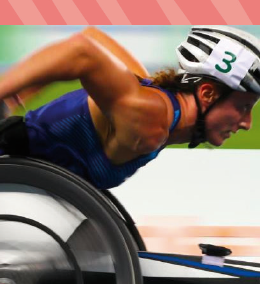IS IT LUCK OR HARD WORK?
Tatyana McFadden is one of the world’s best female wheelchair racer of all time. She has over 15 world gold medals and over 20 major marathon wins. She works hard and trains for hours and hours every day, just like all other successful athletes. But there is something very special about her.
Tatyana was born in Russia in 1989 with a health problem called spina bifida. Her backbone wasn’t developed fully before she was born. Because of that she couldn’t stand or walk on her legs. Tatyana’s mother Nina Polevikova knew that she couldn’t provide the necessary healthcare for her daughter so she made the child available for adoption. For the first six years of her life, Tatyana lived in a Russian orphanage, where she learned to walk on her hands simply to keep up with other children. Those days she didn’t know that powerful arms and hands would make her one of the best athletes in the world.
In 1994, Deborah McFadden, who worked for the Disabilities for the U.S. Department of Health, was visiting orphanages in Russia. When she saw Tatyana she felt a connection and decided to adopt her. Deborah became Tatyana’s family, brought her to the United States and gave her both a wheelchair and a new start on life. ”I was really sick and pretty weak,” McFadden remembers. “I was very underweight.” To help her get more active, her parents enrolled her in a local para-sports program in Baltimore. Tatyana tried every sport she could find; wheelchair basketball, swimming, ice hockey, and even scuba diving. From the start she fell in love with wheelchair racing. Her powerful arms immediately brought success in that sport that she started her professional life as an athlete. Since her first Paralympic competition in 2004 in Athens Tatyana has won many medals. She even set a new world record in the 100–meter race. Her work has inspired many others with disabilities. Recently she has been working on the rights of people with disabilities. “I knew that if I wanted to put an end to this discrimination and make sure that others had the right for the opportunity, I needed to fight this battle,” she says.

